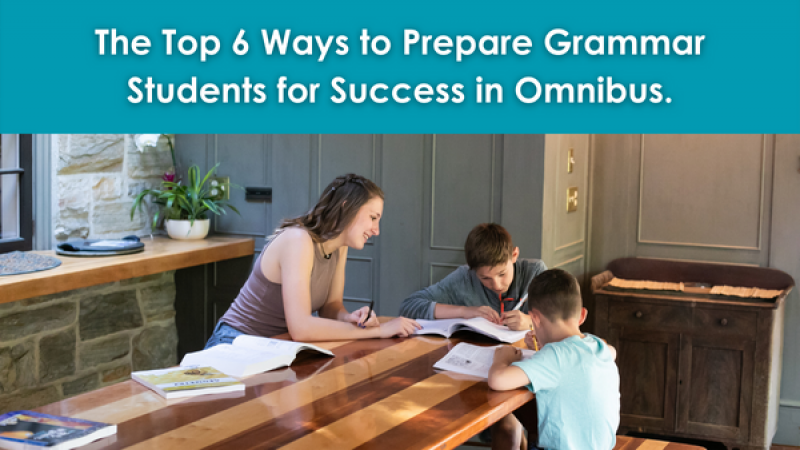The Top 6 Ways to Prepare Grammar Students for Success in Omnibus.

Omnibus is the Great Books course of Veritas Press–and boy is it a lot of books! Bibliophiles salivate over the book list, while reluctant readers dread the thought of it. If you have a grammar-age student now, you probably already know which category they fall in. The Omnibus courses generally begin in 7th grade and continue through 12th grade. Whether your student takes all six levels is up to you, but don’t miss out! Even if your child takes one level of Omnibus, you’ll see the benefit of learning from the past to better live in the present. Here are some tips to prepare your grammar student for success in Omnibus.
1. Focus on reading comprehension and fluency. There is a lot of reading in Omnibus. There’s no way around it if you want to really experience the course as intended. In grammar school, start to develop your child’s reading comprehension skills. Ask them questions about the books they are reading, whether for school or leisure. Veritas has comprehension guides for all of the books in the Literature courses. Work through them with your child; do some oral and written worksheets. For little ones, you can ask simple questions like “What did the boxcar look like?” to “How did the children feel when their father left?” Make it fun with projects or tea parties where you read and discuss passages together. Even if your child struggles with reading, they can still enjoy the story and participate in the discussions. The point is to get your child excited about books!
2. Build a strong grammar and writing foundation. Veritas offers two approaches to grammar and writing that provide a strong foundation for Omnibus. If you use another curriculum, ensure it has good instruction for writing essays. There is a lot of essay writing in Omnibus, and those who can clearly state their thesis and supporting thoughts will succeed in the course. It also wouldn’t hurt to take a logic class or two as there are many debate opportunities in Omnibus.
3. Teach your student to skim read. For some, reading does not come easily, and that is OK. There are other ways to absorb the information in the books without overwhelming your student. Teach them to skim read the drier selections like Herodotus’s Histories and to enjoy the richness of others like Homer’s Odyssey. Your student can also listen to audiobooks in the car or while doing chores. At the end of the day, you know your child better than anyone else, so you decide how they read the books.
4. Teach them to take notes and outline. Good note-taking not only prepares your student for success in Omnibus but in all upper-level courses in general. It is a skill that we recommend all students practice, especially those who have difficulty paying attention. We’ve all zoned out during a lecture at some point, but taking notes in class forces you to be actively engaged and provides a starting point for good study habits.
5. Have discussions. Omnibus teachers will tell you that the discussions are some of the best parts of class. It might not surprise you that teenagers have opinions, but watching them express their opinions on marriage or Christian leadership is a different ball game. It’s not unheard of for a teacher to lose track of time when the topic is so interesting. Prepare your child by simply having conversations at the dinner table. They don’t need to be profound or erudite, but teaching them to listen to what others have to say and then responding kindly, whether they agree or disagree, will help them when discussing more controversial topics.
6. If they aren’t quite ready for the content, take a bridge class. Maybe your child is a strong reader and writer but emotionally or developmentally is not quite ready for the content in some of the books. The Literature Transition and History Transition courses were designed with those students in mind. (They are also great to take if your child hasn’t gone through the Veritas history courses in grammar school.)
Ultimately, you can decide how and when to teach the Omnibus courses. You will know when your child is ready. Whether your student takes one level or all six, they will benefit for the rest of their lives by joining the "Great Conversation."






